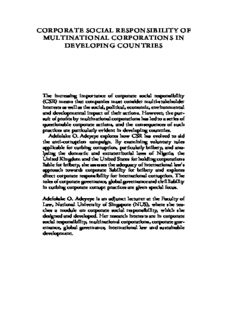
Corporate Social Responsibility of Multinational Corporations in Developing Countries: Perspectives on Anti-Corruption PDF
Preview Corporate Social Responsibility of Multinational Corporations in Developing Countries: Perspectives on Anti-Corruption
CORPORATE SOCIAL RESPONSIBILITY OF MULTINATIONAL CORPORATIONS IN DEVELOPING COUNTRIES The increasing importance of corporate social responsibility (CSR)meansthatcompaniesmustconsidermulti-stakeholder interestsaswellasthesocial,political,economic,environmental anddevelopmentalimpactoftheiractions.However,thepur- suitofprofitsbymultinationalcorporationshasledtoaseriesof questionable corporate actions, and the consequences of such practicesareparticularlyevidentindevelopingcountries. Adefolake O. Adeyeyeexplores how CSR has evolved to aid the anti-corruption campaign. By examining voluntary rules applicableforcurbingcorruption,particularlybribery,andana- lysing the domestic and extraterritorial laws of Nigeria, the UnitedKingdomandtheUnitedStatesforholdingcorporations liableforbribery,sheassessestheadequacyofinternationallaw’s approach towards corporate liability for bribery and explores directcorporateresponsibilityforinternationalcorruption.The rolesofcorporategovernance,globalgovernanceandcivilliability incurbingcorporatecorruptpracticesaregivenspecialfocus. Adefolake O. Adeyeye is an adjunct lecturer at the Faculty of Law, National University of Singapore (NUS), where she tea- ches a module on corporate social responsibility, which she designedanddeveloped.Herresearchinterestsareincorporate socialresponsibility,multinationalcorporations,corporategov- ernance, global governance, international law and sustainable development. CORPORATE SOCIAL RESPONSIBILITY OF MULTINATIONAL CORPORATIONS IN DEVELOPING COUNTRIES Perspectives on Anti-Corruption ADEFOLAKE O. ADEYEYE cambridge university press Cambridge,NewYork,Melbourne,Madrid,CapeTown, Singapore,SãoPaulo,Delhi,MexicoCity CambridgeUniversityPress TheEdinburghBuilding,Cambridgecb28ru,UK PublishedintheUnitedStatesofAmericabyCambridgeUniversityPress,NewYork www.cambridge.org Informationonthistitle:www.cambridge.org/9781107013629 ©AdefolakeO.Adeyeye2012 Thispublicationisincopyright.Subjecttostatutoryexception andtotheprovisionsofrelevantcollectivelicensingagreements, noreproductionofanypartmaytakeplacewithoutthewritten permissionofCambridgeUniversityPress. Firstpublished2012 PrintedintheUnitedKingdomattheUniversityPress,Cambridge AcataloguerecordforthispublicationisavailablefromtheBritishLibrary LibraryofCongressCataloguinginPublicationdata Adeyeye,AdefolakeO.,1972– Corporatesocialresponsibilityofmultinationalcorporationsindevelopingcountries: perspectivesonanti-corruption/AdefolakeO.Adeyeye. p. cm. isbn978-1-107-01362-9(hardback) 1. Internationalbusinessenterprises–Lawandlegislation. 2. Corporategovernance–Law andlegislation. 3. Socialresponsibilityofbusiness. 4. Internationalbusinessenterprises– Corruptpractices–Developingcountries 5. Corruption–Developingcountries– Prevention. I. Title. K1322.A9342012 346’.0664–dc23 2011039586 isbn978-1-107-01362-9Hardback CambridgeUniversityPresshasnoresponsibilityforthepersistenceor accuracyofURLsforexternalorthird-partyinternetwebsitesreferredto inthispublication,anddoesnotguaranteethatanycontentonsuch websitesis,orwillremain,accurateorappropriate. Contents Preface pageix Tableofinternationalagreements,charters,conventions, declarationsandtreaties xi Tableofstatutesandordinances xii Tableofcases xiii Listofacronymsandabbreviations xvi Introduction 1 part i corporate social responsibility and anti-corruption 5 1 Corporatesocialresponsibility 7 DefinitionandscopeofCSR 7 Docorporationshavebroadresponsibilities? 8 IsCSRbeyondrulesorsubjecttovoluntaryormandatoryrules? 11 AreuniversalstandardsofCSRevolving? 12 GlobalchangestoCSR 15 LegalawarenessoftheneedforCSR 15 The‘spotlighteffect’ 22 Legalaction 25 CorporateawarenessoftheimportanceofCSR 34 Conclusion 39 2 Anti-corruptionasaCSRstandard 41 Whatiscorruption? 42 Multinationalcorporationsandinternationalcorruption 44 Selectedvoluntaryrulesandimpacts 49 TransparencyInternational’sBusinessPrinciplesfor CounteringBribery(TIBusinessPrinciples) 49 v vi Contents WorldEconomicForumPartneringagainstCorruption PrinciplesforCounteringBribery(PACIPrinciples) 51 InternationalChamberofCommerceRulesofConductand RecommendationsforCombatingExtortionandBribery (ICCRules) 54 Selectedmandatoryrulesandimpacts 56 UnitedKingdom 57 UnitedStates 63 Nigeria 66 Usefulnessofextraterritoriallawsforcurbinginternational corruption 70 Conclusion 73 part ii special focus on mechanisms for curbing international corruption from a csr perspective 75 3 Globalgovernance 77 Whatisglobalgovernance? 78 Globalgovernanceandcorruption 79 Reformandstrengtheningofinstitutionsforcurbingcorruption 79 Co-ordinationofanti-corruptioncollaborativeefforts 85 Regulationandcontrolofglobalgovernancethroughtheuseof globaladministrativelaw 92 Classificationofglobalgovernance 9933 Multiplicityofactors 94 Globalgovernancechallenges 95 Impactofglobalgovernanceondevelopingcountries 97 Conclusion 102 4 Internationallaw 104 Curbinginternationalcorruption 105 Regionallaws 107 TheOrganizationofAmericanStatesInter-American ConventionagainstCorruption(Inter-American Convention) 107 CouncilofEuropeCriminalLawConventiononCorruption 110 AfricanUnionConventiononPreventingandCombating Corruption(AUConvention) 113 Multiregionallaws 115 Contents vii TheOrganizationforEconomicCo-operationand DevelopmentConventiononCombatingBriberyof ForeignPublicOfficialsinInternationalBusiness Transactions(OECDAnti-BriberyConvention) 115 TheUNConventionagainstCorruption(UNCAC) 126 Directcorporateresponsibilityunderinternationallaw 128 Modelofinternationalcorporateresponsibility 133 Unintendedconsequencesofinternationalcorporate responsibility 139 Conclusion 145 5 Civilremedies 147 Corruptionandtheenforceabiltyofinternationalcontracts 148 Enforcementofforeignarbitralawardstaintedwithbribery 148 Internationalcommercialarbitrationandthevalidityof internationalcontractstaintedwithbribery 153 Privaterightsofactionfordamagesbyvictimsofcorruption 162 Privateactionsagainstcorruptcompetitorsininternational commerce 163 Conclusion 166 6 Corporategovernance 168 Whatiscorporategovernance? 169 Corporategovernanceandcorruption 171 Internationalcorruptionandtheuseofshareholderderivative suits 174 DerivativesuitsintheUS 175 DerivativesuitsintheUK 186 Roleofinstitutionalinvestorsincurbinginternationalcorruption 189 EffectofRuggie’sframework 192 Conclusion 193 7 Implicationsofselectedanti-corruptionmechanismsinthe contextofdevelopingcountriesandCSR 194 TherelevanceofCSRforanti-corruptioncampaignsindeveloping countries 195 Theneedforamultiprongedapproach 196 Conclusion 197 Bibliography 198 Index 217 Preface This book is a product of my PhD thesis which I undertook at the Faculty of Law, National University of Singapore. Moving to Singapore with my husband in 2000, I had no idea I would pursue aPhDandthenundertaketowriteabookadaptedfromthethesis. Writing thisbook has been a long and arduous task. Between the time the PhD degree was awarded and the publication of this book, corporate social responsibility (CSR) has undergone drastic changes. TheworkoftheSpecialRepresentativeoftheUNSecretary-General (SRSG) on business and human rights, which has wide-ranging implicationsforCSRanddevelopingcountries,iscomplete.InJune 2011, the UN Human Rights Council endorsed the Guiding Principles on Business and Human Rights. Interestingly, the SRSG’s mandate was created in 2005, the same year I commenced myPhD.Theroleofinstitutionalinvestorsandofcorporategovern- anceingeneralinpromotingCSRisnowmorepronounced.TheUK Bribery Act, which was passed in 2010 after years of criticism about thestateofthecorruptionlawsintheUK,cameintoforceon1July 2011.Ithasbeenfascinatingbutdemandingtofollowthechangesthat have occurred. Where possible I have tried to accommodate the implicationsofsomeofthesechangesinthebook. This book focuses primarily on anti-corruption as a CSR issue. It exploresmechanismsthatareusefulforcurbinginternationalcorrup- tion, including both voluntary and mandatory rules. The aim is to providea fresh outlookon avenues for eliminating corruption,espe- ciallyindevelopingcountries,throughthelensofCSR. The completion of my thesis and then the book would not have beenpossiblewithoutthesupportofalargenumberofpeople.Iam indebted to my PhD supervisor, Professor Sornarajah, for his ix x Preface guidanceandfriendship.Tomyfriends,toomanytolist,thankyou for the prayers and support. Finally, I would like to express my heartfelt gratitude to my family. Kunle, I couldn’t possibly have donethiswithoutyou.Fope,ObaandAji,youputsomuchmeaning intolife!
Description: